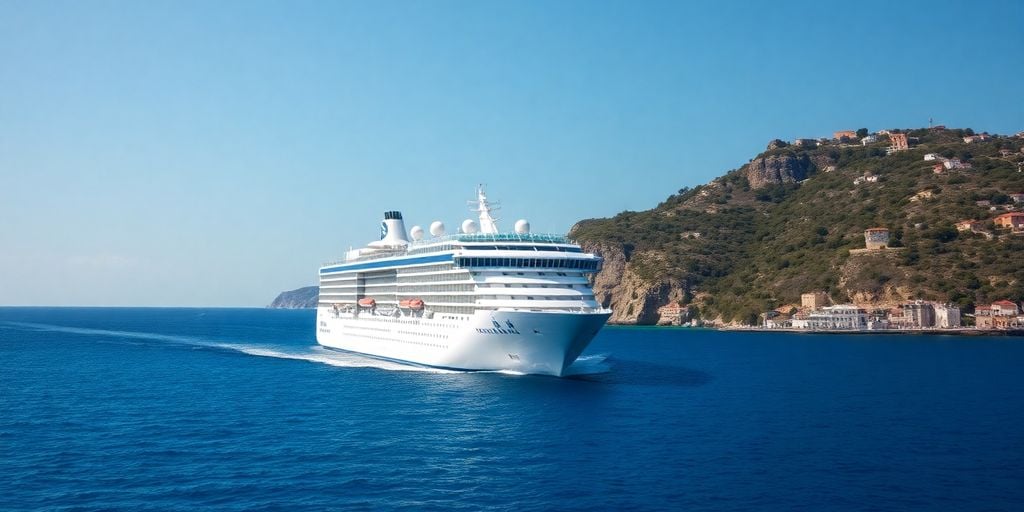Cruise Ship Diverted Amidst Pro-Gaza Protest in Greece
A cruise liner carrying over 1,600 Israeli passengers was rerouted to Cyprus after protesters blocked its docking at the Greek island of Syros. Demonstrators, citing concerns over Israel’s actions in Gaza, prevented passengers from disembarking, leading the ship’s operators to cancel the stop due to safety concerns.
Key Takeaways
- An Israeli cruise ship, the Crown Iris, was denied docking at Syros, Greece.
- Over 300 pro-Palestinian protesters gathered at the port, waving Palestinian flags and displaying banners like "Stop the Genocide."
- The protest cited Israel’s conduct in the Gaza war and its relationship with Greece.
- The ship, operated by Mano Maritime, was rerouted to Limassol, Cyprus.
- Israeli Foreign Minister Gideon Saar contacted his Greek counterpart regarding the incident.
- Greek authorities condemned the protest, labeling it "outrageous" and stating that antisemitism would not be tolerated.
Protest Details and Rerouting
The MS Crown Iris, operated by Israeli company Mano Maritime, was on a Mediterranean voyage with scheduled stops in Rhodes, Syros, and Limassol. Upon arrival at Syros, approximately 300 demonstrators blocked the dock, chanting anti-Israel slogans and distributing flyers. The protesters expressed that it was "unacceptable" to welcome Israeli tourists while Palestinians suffered in Gaza.
Despite initial reports of a brief delay, the situation escalated. Greek police were slow to arrive on the scene, and ship authorities ultimately decided to cancel the stop. The Crown Iris was diverted to Limassol, Cyprus, later that afternoon. Passengers were instructed to remain onboard for their safety, with some expressing stress, particularly the children on board.
Diplomatic and Governmental Response
Following the incident, Israel’s Foreign Minister Gideon Sa’ar contacted his Greek counterpart, Giorgos Gerapetritis, to discuss the situation and request intervention. Israeli diplomats maintained close contact with their counterparts in Athens, warning that the episode could impact bilateral tourism ties, given that an estimated 621,000 Israelis visited Greece in 2024.
The Greek government spokesperson, Pavlos Marinakis, condemned the protest as "outrageous" and unequivocally stated that "any form" of antisemitism "will not be tolerated in Greece." He emphasized that while protesting is not prohibited, authorities must ensure such incidents do not recur and that citizens are protected regardless of their origin or religion. Marinakis also noted the need for caution regarding the line between protest and acts directed against individuals based on their background.
Broader Context and Concerns
The Syros incident is viewed as part of a growing global trend of hostility towards Israeli and Jewish travelers. In recent months, Greece has seen an increase in anti-Israel sentiment, including vandalism of Israeli-owned businesses and attacks on tourists. The Greek National Security Council has advised Israeli citizens to exercise heightened caution while visiting the country. The protest on Syros highlighted mounting disquiet in Greece over Israel’s actions in Gaza, with anti-Israeli graffiti and pro-Palestinian signage proliferating across the country.
Sources
- Israeli cruise ship turned away from Greek island by Gaza war protest | Greece, The Guardian.
- Protesters Block Israeli Cruise Ship in Greece, Forcing Reroute to Cyprus, Combat Antisemitism Movement.
- Gaza protest on Greek island stops Israeli visitors from touring Syros, AP News.
- Greece condemns ‘outrageous’ protest that barred Israeli cruise ship from docking: ‘Antisemitism will not be
tolerated’, The Times of Israel.






